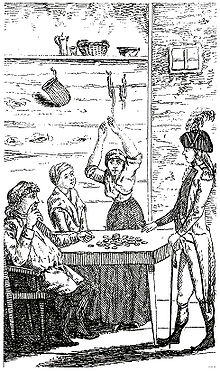Bourla-Papey
The Bourla-Papey ( Vaudois dialect , corresponding to French brûle-papiers "paper burners") were a rural people's movement in the Helvetian canton of Léman , which campaigned militantly in 1802 for the abolition of sovereign rights.
The thirteenth article of the Helvetic Constitution of April 12, 1798 prohibited all inalienable burdens, interest and easements on land. This resulted in the abolition of the feudal taxes that came from the time of the old Confederation . However, the associated tithes and land or land interest were essential for the financing of public tasks as long as no modern tax system was developed. A law of November 10, 1798 should bring the necessary reforms; these were not implemented due to the economic and political disruption of the republic and were repealed on September 15, 1800, whereby the old taxes were valid again.
The unsuccessful reform brought the Helvetic Republic into disrepute among its former rural subjects. The storm on land interest rates in the canton of Basel in the autumn of 1800 was the first reaction, the most violent consequences were the Bourla-Papey in the spring of 1802. The vehemence of this uprising was due to the fact that the land and land taxes in the Vaud were of outstanding ideal and material importance . In the spring of 1798, the canton of Léman was the gateway for the French intervention, which overthrew the old Confederation and achieved its revolutionary transformation into the Helvetic Republic. It provided around a quarter of all state income and, as a former subject area, had also been Bern's granary . Republic and freedom from traditional land taxes were seen as one by the rural population of Vaud.
Between February and May 1802 between two and three thousand Vaudois farmers gathered and destroyed the files of numerous former feudal lords who claimed basic and land rights. The archives of 132 municipalities in Vaud, a little over a third of all municipalities, also fell victim to the flames. On May 8, 1802, the rebels under the leadership of the Jacobin and recruiting officer Louis Reymond occupied the canton capital of Lausanne , only to withdraw on May 11 against the promise of an amnesty . Nevertheless, in June 1802, a special court imposed several death sentences and prison sentences, which the Helvetian government, through the intercession of Henri Monod and under the pressure of the plug-in liqueur war , overturned all of them by October 15, 1802. On September 29, it had also issued a special law in Vaud, where it had a final base of power, to waive the inalienable land tax.
literature
- Jacques Besson: L'insurrection des Bourla-Papey (Brûlers de Papiers) et l'abolition des droits féodaux dans le canton de Vaud. Editions Ouverture, Le Mont-sur-Lausanne 1998.
- Charles-Ferdinand Ramuz : La guerre aux papiers. Mermod, Lausanne 1942. (Literary translation of historical events.)
Web links
- Antoine Rochat: Bourla-Papey. In: Historical Lexicon of Switzerland .
